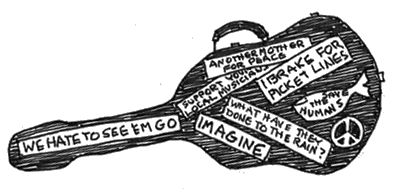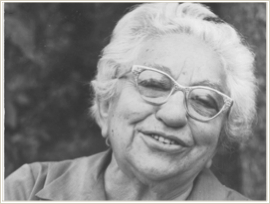


We
went to see the new river otter exhibit at the Monterey Aquarium last
week, and on the way we visited my second cousin once removed, Ed
Newman, and his wife Carol. I hadn’t seen them in at least thirty years.
“You look just the same,” Ed said, and I don’t, but I knew what he
meant, because he looked essentially the same to me too. His mother,
Jennie, was my mother’s favorite aunt (she was just ten years older than
my mom) and my favorite of her generation. When I wanted to add my own
verses to Ruth Pelham’s Grandma song,
I realized I didn’t want to write about either of my grandmothers, but
about my great-aunt Jennie. I spent summers with her during World War II
when my mother was working in a bomb casing factory. Driving over the
Santa Cruz mountains took me right back to all the times I went there
with my parents. Here’s a piece I wrote from my memories of those summer
days for a class I took on writing children’s books:
THE BEST TREE IN THE WORLD
The best tree in the world grew in front of my great-aunt
Jennie’s house in Santa Cruz. It was a maple, and it grew at the front
edge of her lawn, so that half the tree overhung the street. Laurel
Street was a long, wide concrete slope that stopped a few houses above
Aunt Jennie’s. If I sat in the tree I could look several blocks down the
street without being seen myself. The limbs were set so that the tree
was easy to climb; the bark was smooth and comfortable. One stubby
branch was just the right size for child hands to grasp and swing on,
and the right distance above the ground to drop down from. It was
well-worn from the rubbing of my hands, my cousins’ hands, and the hands
of the kids three doors down. The maple was a place to play together or
alone. It was also a place to sit and think, away from grown-ups’
intrusions. It was the best feature of a generally interesting
household.
In the back yard were the chicken coop, a tangle of blackberry
bushes and the vegetable garden (I remember onions and artichokes). I
also remember debating with one of the neighbor girls whether an onion
pulled up from the ground was still alive. In the house were my capable
great-aunt and great-uncle and often a scattering of second-cousins of
various sizes and ages. Saturday nights there was a poker game to
observe, with chips to play with and cigar smoke to endure. Aunt Jennie
showed me the forming eggs in a chicken she’d killed and taught me to
make nine-patch squares. I further improved my mind by reading her books
(I remember only Mary Lasswell’s Suds in Your Eye) and by reading comic
books aloud to my younger cousin Freddy. Freddy had a b-b gun, and we
hunted snails with it in the blackberry jungle. When big cousin Eddie
was around, we would wheedle a trip to the beach in his jeep.
When I was the only cousin in residence and the neighbor kids
were away, I would go up to the end of the street and around the corner
to watch the waterfall where a little stream entered a culvert.
Dragonflies hovered over the water, and small trees and bushes shaded
the stream above the fall. Much later, when I read “water is heavy
silver over stone” it was this rushing, leaping water over stones set in
concrete that I thought of.
Then one summer we drove up to Aunt Jennie’s house and I didn’t
recognize it at all. The house looked suddenly smaller, exposed. The
whole street was bare. The maple was gone. I was shocked and
unbelieving. Aunt Jennie explained apologetically that a man had
persuaded her that the limbs over the street would fall off and crush
somebody’s car and she would be sued, so she let him cut it down. It is
the only time I can remember being disappointed in her.
Ed
told me that he didn’t get the jeep until after WWII, so I must have
ridden in it when I visited from Long Beach (when I was old enough to
take the train home alone) and conflated that memory with the earlier
ones.
The moral of this story is, don’t trust my memory!
I
called my friend Candy when I got home to recommend the river otters,
parents and five half-grown pups, rolling non-stop cuteness. Candy wrote
“Head First and Belly Down,” the river otter song on our CD Sun, Sun Shine.
And
here is the portrait of Jennie as my professional photographer aunt
intended it, without the cropping necessary to fit in iWeb’s Procrustean bed.

PS
In the post for January 2, “Vocabulary” I quoted my father saying
“purest ray serene.” The other day I was looking for some poem (I can’t
now remember which one) in A Golden Treasury of English Verse.
I didn’t find it, but I started browsing around and, passing my eyes
over Grey’s “Elegy Written in a Country Churchyard,” found, in the
fourteenth verse,
Full many a gem of purest ray serene
The dark unfathom’d caves of ocean bear...
I don’t know whether Grey made the phrase up or was using some commonplace of his time. Anybody?
©2007 by Nancy Schimmel

Monday, April 16, 2007


SPRING BREAK






